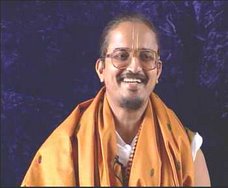Nama Article 12th September 2014
Sant Narasimha Mehta (Narsi Metha)
In the state of Gujarat, in India, there lived a great devotee named Narsi Metha. One of his songs, "Vaishnava Janato", which describes the attributes of a true Vaishnava is very famous. This song was also the favorite one of Mahatma Gandhi whom the Indians adore as the Father of the Nation. Mahatma Gandhi always sang this song while attending prayer gatherings.
Narsi Metha lost his parents at a very yound age and was brought up by his elder brother. His elder brother was very affectionate and took care of him like his own son. Even as a child, Narsi Metha was attracted to the company of holy men and ended up attending Bhajans instead of going to school. Upset on knowing that Narsi Metha was not attending to his studies properly, his brother's wife reprimanded him severely and sent him out of house. Wounded by her words, the child left the house crying. Not knowing where he was going, Narsi Metha entered a dense forest which was the habitat of wild animals. Frightened and lonely, the child spent the night crying and embracing a Shiva Linga that he found in the forest.
Devoid of both sleep and food, and scared to move from the place, the child spent many days in the company of the Shiva Linga, crying and praying to the Lord to show him a way out of this trouble. Gladdened by the child's devotion, Lord Shiva appeared before Narsi Metha and said, "My child! I love children like you! Just as you have pleased me now by your devotion, in the days of yore a child named Markandeya worshipped me and I blessed him with immortality. Chandikesan too, as a child worshiped me and I crowned him as the King of the empire of My devotees. Similarly, Upamanyu worshipped me praying for milk and I showed him the ocean of milk(ThiruPărKadal). When Jnănasambandan cried for milk, Parvati Devi herself fed the child with Her milk. I am the father and mother of all those who have none to call as their own."
Saying so, Lord Shiva, blessed Narsi Metha with the vision of Lord Krishna. From then on the devotion of Narsi Metha towards Lord Krishna grew by leaps and bounds and he composed and sang many beautiful kirtans on the Lord. Lord Gopala too played with Narsi Metha in innumerable ways.
Srimad Bhagavatham 12:13:16
निम्न-गानां यथा गङ्गा देवानाम् अच्युतो यथा
वैष्णवानां यथा शम्भुः पुराणानाम् इदं तथा
Just as the Ganga is the greatest of all rivers, Lord Achyuta the supreme among deities and Lord Sambhu [Siva] the greatest of Vaisnavas, so Srimad-Bhagavatam is the greatest of all Puranas.
Please check these: Excerpts from a discourse by our Sri Sri Muralidhara Swamiji
Vaishnav is the one who has been addicted to the elixir of the name of God
Atonce Lord Shiva said "it is enough if one chants the name "Rama."
Greatness of Chanting the Divine Name of Lord Shiva
Rama is indeed the highest teaching
Our ancient Sages and Rishis have glorified the Rama Nama
Chant the Mahamantra Nama kirtan :
Hare Rama Hare Rama Rama Rama Hare Hare
Hare Krishna Hare Krishna Krishna Krishna Hare Hare

No comments:
Post a Comment